|
|
|
Sort Order |
|
|
|
Items / Page
|
|
|
|
|
|
|
| Srl | Item |
| 1 |
ID:
159398
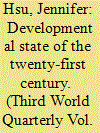

|
|
|
|
|
| Summary/Abstract |
As development is no longer simply conceived of as economic growth, but also as encapsulating human development, the role of the developmental state must be rethought. Focusing on the state’s ability to deliver collective goods such as welfare has become an important task for developing and developed nations alike, and nowhere is this more important than in China. Consequently, intimate connections between the political and industrial elites are no longer sufficient and may actually be counterproductive to the success of the developmental state. Diverging from traditional developmental states, China shows that incorporation of new stakeholders is not premised on principles of human development. The novelty that China brings to re-thinking and re-articulating a new developmental state framework is that the development state of the twenty-first century can create new alliances such as with non-governmental organisations to meet human development objectives, but substantive change with regards to how the state is organised is not a precondition.
|
|
|
|
|
|
|
|
|
|
|
|
|
|
|
|
| 2 |
ID:
159403
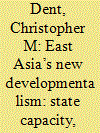

|
|
|
|
|
| Summary/Abstract |
This paper argues that to understand the relevance of developmental states in East Asia and elsewhere, we need to focus on the changing development agenda in the early twenty-first century, especially how this connects with the global challenge of climate change and thereby sustainable, low-carbon development. It combines theories on state capacity and ecological modernisation to form the ‘new developmentalism’ concept. This is applied to study revitalised and refocused forms of state capacity aimed at realising the transformative economic objectives associated with sustainable development. New developmentalism helps us understand not only current state capacity practice in a climate challenged world but also how we have moved beyond original conceptions of developmental statism. It may be understood in the wider context of the sustainable development agenda and climate interventionism. As is argued, new developmentalism is most clearly evident in East Asia but can be applied in a wider geographic sense where strong forms of developmental state capacity are exercised towards meeting transformative sustainable development goals.
|
|
|
|
|
|
|
|
|
|
|
|
|
|
|
|
| 3 |
ID:
159401
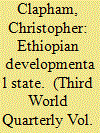

|
|
|
|
|
| Summary/Abstract |
Ethiopia provides one of the clearest examples of a ‘developmental state’ in Africa. Drawing on a deeply entrenched experience of statehood, the present Ethiopian regime has embarked on an ambitious programme, depending on the central capture of ‘rents’, to fund a massive expansion especially in communications, education, and hydroelectricity. High initial rates of growth have been achieved. However, the political setting is tightly constrained and the state has not allowed the private sector freedom of action to generate the required levels of production. Ultimate success will depend on the capacity to transform a state that has itself been central to the development process.
|
|
|
|
|
|
|
|
|
|
|
|
|
|
|
|
| 4 |
ID:
159404
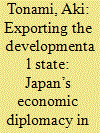

|
|
|
|
|
| Summary/Abstract |
Japan remains a developmental state where the state guides and oversees economic development, and the strong bureaucracy and businesses in turn complement each other in leading and shaping policies to achieve developmental goals. Japan retains the institutions deemed necessary to enhance the cooperative behaviour of the bureaucracy, businesses and politicians, and norms about what is important in order for an interventionist state to implement policies aimed at achieving economic development and the autonomy of the state. Externally, Japan has practised economic diplomacy with tools such as development assistance to achieve its economic security and to promote the developmental state model abroad. The process of making foreign policy contextualised and reinforced the norms, for both Japan’s domestic and international audiences. Japan today tries to promote science and technology as a main catalyst for creating industries and supporting its domestic, export-oriented economy. This is based on Japan’s own interpretation of its historical path and economic success and is also used to justify its engagement in the Arctic, a region where Japan does not have any sovereign territories. Japan’s Arctic policy is as an extension of its economic diplomacy and an attempt to export the Japanese developmental state model.
|
|
|
|
|
|
|
|
|
|
|
|
|
|
|
|
| 5 |
ID:
159402
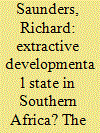

|
|
|
|
|
| Summary/Abstract |
In recent years, an upturn in international commodity markets and the poor development performance of mineral rich African countries have catalysed the resurgence of debate and policy initiatives focused on extractivist models of growth in southern Africa. Beginning with debates on the ‘resource curse’, the East Asian developmental state and ‘developmental patrimonialism’, we extend the discussion to consider key unique challenges in contemporary African states: questions of finance and debt leverage, foreign capital domination and the problematic legacy of neoliberal structural adjustment. We consider the cases of Zambia and Zimbabwe, two countries heavily reliant on mining, in which current policy interventions have sought to anchor developmental state ambitions in the restructuring of the minerals sector. These cases illuminate the significance of current developmentalist politics in southern Africa, and underscore their specificity and constraints. Developmentalist projects are unlikely to succeed in the short term, but retain importance as emerging points of critique of neoliberal states in transition.
|
|
|
|
|
|
|
|
|
|
|
|
|
|
|
|
| 6 |
ID:
159400


|
|
|
|
|
| Summary/Abstract |
This paper examines the changing strategies of developmental states using Brazil’s oil-based industrial policy as a case study. We analyse the relationship between the state, Petrobras and industrial elites in the context of Brazil’s renewed emphasis on sector-specific industrial development strategy. Taking stock and re-examining the developmental state model, we suggest that developmental states are inherently political, particularly their bureaucracy and state-owned enterprises (SOEs), and that money politics is intricately woven into state-guided high growth regimes. Given the difficulty of privatisation as a solution to SOE (mis)governance, the challenge for Brazil is to mediate extreme political interventions that have eroded Petrobras’ autonomy in the past and to sustain institutional capacity to direct rents towards investment and innovation.
|
|
|
|
|
|
|
|
|
|
|
|
|
|
|
|
| 7 |
ID:
159397
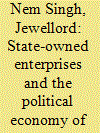

|
|
|
|
|
| Summary/Abstract |
The literature on developmental states has built theories of growth-enhancing strategies through a mutually constitutive state–business relationship and institutionalised expertise through a professional bureaucracy. Whilst most evidence bears on the East Asian context, recent empirical work has focussed on state agency and new industrial policies in response to global market integration. Our paper contributes to this debate by exploring multiple patterns of state enterprise reforms that have enabled governments to generate competitive domestic firms. These reforms, then, lead to new theoretical insights as regards the diverse institutional arrangements co-constituting state–state relationships across countries and sectors. Overall, the paper views state-owned enterprises (SOEs) as complex organisations that bear new developmental capacities rather than vessels of rent-seeking interests.
|
|
|
|
|
|
|
|
|
|
|
|
|
|
|
|
| 8 |
ID:
159396
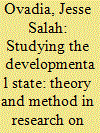

|
|
|
|
|
| Summary/Abstract |
This paper examines theoretical and methodological issues in the study of African developmental states. We argue that applying this concept beyond East Asia must take into account changes in the global economic context – in particular systemic tendencies towards deficient consumer demand – to uncover the conditions under which demand for commodity production remains or becomes expansionary. We further argue for a mixed methods case study approach to structural transformation, blending quantitative and qualitative evidence at multiple levels of analysis. The examples of concrete manufacturing and oil and gas in Nigeria and Tanzania illustrate our approach to researching state-led development in Africa.
|
|
|
|
|
|
|
|
|
|
|
|
|
|
|
|
| 9 |
ID:
159395


|
|
|
|
|
| Summary/Abstract |
Reviewing decades of thinking regarding the role of the state in economic development, we argue for the continued relevance of the concept of the ‘developmental state’. With reference to Argentina, Brazil, Ethiopia, Rwanda and China, we contend that new developmental states are evidence of a move beyond the historical experience of East Asian development. Further, we argue for the applicability of the developmental state framework to key questions of governance, institution building, industrial policy and the extractive industries, as well as to a wide variety of cases of successful and failed state-led development in the early twenty-first century.
|
|
|
|
|
|
|
|
|
|
|
|
|
|
|
|
| 10 |
ID:
159399
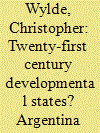

|
|
|
|
|
| Summary/Abstract |
Can the policies pursued by successful examples of developmental states be transferred to other countries under current global conditions? This question has represented one of the key concerns of the academic community in the wake of this reinterpretation of East Asian developmental success. This article will contribute to both the Latin American literature and the developmental state literature simultaneously and symbiotically, through arguing that Argentina in the period 2003–2015 represents an excellent empirical opportunity to revisit key debates associated with the concern of transferable lessons from the original East Asian developmental state experience.
|
|
|
|
|
|
|
|
|
|
|
|
|
|
|
|
|
|
|
|
|